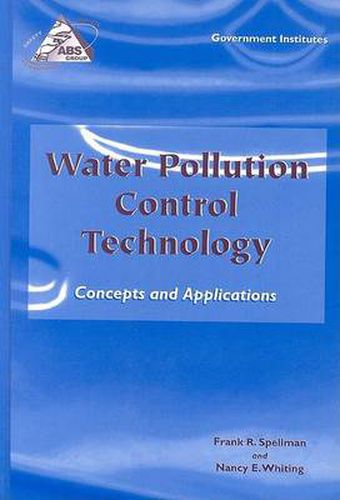Readings Newsletter
Become a Readings Member to make your shopping experience even easier.
Sign in or sign up for free!
You’re not far away from qualifying for FREE standard shipping within Australia
You’ve qualified for FREE standard shipping within Australia
The cart is loading…






Water Pollution Control Technology focuses on the practical use of tested technologies for cleaning up and controlling water pollutants and for protecting public health. Written in an easy-to-read conversational tone, this handbook provides readers with a thorough understanding of the concepts and applications of monitoring, sampling, and regulating water pollution. It also examines the relatively new field of water pollution control technology and focuses on applying engineering principles to the planning, design, construction, and operation of common water processes.
Each of the 25 chapters introduces applicable scientific concepts to help readers better assess the available technologies. The authors cover a wide range of topics, including technical and scientific issues as well as the fields of biology,ecology, geology, physics, chemistry, hydraulics, and hydrology.
Environmental managers, attorneys, consultants, regulators, and students alike will benefit from the numerous definitions, calculations, problems, solutions, case studies, and real-life examples included throughout the book. Chapter summaries, references, and review questions are also included.
$9.00 standard shipping within Australia
FREE standard shipping within Australia for orders over $100.00
Express & International shipping calculated at checkout
Water Pollution Control Technology focuses on the practical use of tested technologies for cleaning up and controlling water pollutants and for protecting public health. Written in an easy-to-read conversational tone, this handbook provides readers with a thorough understanding of the concepts and applications of monitoring, sampling, and regulating water pollution. It also examines the relatively new field of water pollution control technology and focuses on applying engineering principles to the planning, design, construction, and operation of common water processes.
Each of the 25 chapters introduces applicable scientific concepts to help readers better assess the available technologies. The authors cover a wide range of topics, including technical and scientific issues as well as the fields of biology,ecology, geology, physics, chemistry, hydraulics, and hydrology.
Environmental managers, attorneys, consultants, regulators, and students alike will benefit from the numerous definitions, calculations, problems, solutions, case studies, and real-life examples included throughout the book. Chapter summaries, references, and review questions are also included.